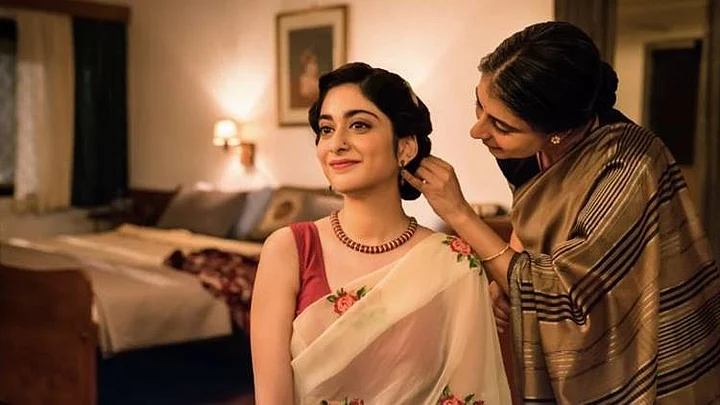The adaptation of one of modern India’s most famous literary works, could 'A Suitable Boy’s screen translation finally nudge Vikram Seth to complete the long-awaited sequel?
The debut of the Mira Nair-directed television series based on Vikram Seth’s A Suitable Boy delivers on a promise the filmmaker made ever since the book came out. Nair reportedly wanted to adapt Seth’s seminal 1993 novel that follows the story of four families after the independence of India as a mother searches for a suitable boy to marry her daughter, but something or the other did not let her. It wouldn’t have been easy to convert the 1349-pages opus into a film, or even a mini-series.
Nair also tried to lay her hands on the rights. When she was unable to get the rights, Nair made Monsoon Wedding as a ‘microcosmic response.’ In the years that followed, there had a been a failed attempt to adapt A Suitable Boy on film. Although it was dramatised for radio in 2002, both the book and Seth were more in the news for the sequel whose release was supposed to coincide with the book’s twentieth anniversary.
Ever since it was announced in 2009 that Seth would come out with A Suitable Girl, readers have been thinking about the universe that the author created.
Seth missed deadlines, was asked to return the $1.7 million advance to the original publishers, Penguin Random House, found a new publisher in Orion, suffered a break-up with long time partner, which also added to his writer’s block, and now, even after the near-impossible adaption of A Suitable Boy has happened, A Suitable Girl is still not ready.
An immensely popular book, A Suitable Boy was an instant best-seller and also enjoyed critical acclaim. Although it was snubbed when it came to the Booker Prize shortlist, a development that promoted publisher Anthony Cheetham to call the Booker judges “a bunch of wankers.”
The book has been an indelible part of the readers’ conscious mind for almost three decades. It’s also one of the reasons why there is a great deal of intrigue surrounding Nair’s screen adaptation. The series has opened to sumptuous reviews in the United Kingdom, but it’s baffling why the makers would be okay with condensing the sweeping epic into a handful of episodes.
When it first came out, adapting A Suitable Boy for the screen was the kind of thing few would attempt.
It raised the same questions that were asked when filmmakers pitched adaptions of F. Scott Fitzgerald’s The Great Gatsby or Fyodor Dostoevsky’s Crime and Punishment.
Both have been adapted multiple times but it’s near impossible to capture the spirit of such works, especially the symbolic tone of the era, and A Suitable Boy fell in the same category. Condensing A Suitable Boy would do injustice to the mood and feel and in an era where it would be relatively easier to do a more faithful adaption, Nair and screenwriter Andrew Davies, oddly enough, decided to distil the “novel into six hours.”
Beginning in the late 1980s, Chinese literary adaptions changed the way the world looked at its cinema. Although many people were aware of Zhang Yimou’s highly acclaimed films Red Sorghum, Raise the Red Lantern, and To Live, few knew that they were based on books. The popularity of the films made audiences beyond the physical boundaries of China discover Mo Yan’s Red Sorghum Clan, Su Tong’s Wives and Concubines and To Live by Yu Hua. In the mid-1990s, Dev Benegal’s film version of Upamanyu Chatterjee’s English, August (1994) came close to doing something similar for Indian writers. A few years later, when Pamela Rooks adapted Khushwant Singh’s Train to Pakistan (1998) many felt that an exploration of the literary origins of these films would become a reality. But as luck would have it, this did not happen.
The arrival of the OTT platform has come as a blessing for novels and books because unlike cinema, it’s easier to pitch authentic (read true to length) literary adaptations.
In this context, A Suitable Boy offers a great opportunity for a revival of genuine interest in modern Indian literary classics.
However, there is also a chance that this rejuvenation could get sidelined, thanks to a generous helping of presentism accompanying the interpretations.
On the one hand, Nair is keen on authentic Indian representation in stories such as A Suitable Boy, on the other hand, she is also keen that people watch A Suitable Boy as “a mirror to what we are facing today.”
Nair feels, in a way, A Suitable Boy speaks about the repressive nature of [Indian Prime Minister Narendra] Modi’s government,
One can choose to emphasise those parallels or not, and she very much chose to. This phenomenon is not uncommon in today’s television adaptations where creators of series based on the 1962 and 1985 dystopian novels by Philip K. Dick and Margaret Atwood, The Man in the High Castle and The Handmaid’s Tale respectively, have on many occasions said their interpretations are an allegory of the post-President Donald Trump's United States.
The adaptation of one of modern India’s most famous literary works could finally nudge Vikram Seth to complete the long-awaited sequel. Ironically, Seth’s A Suitable Girl is supposedly based in more contemporary times.
(At The Quint, we question everything. Play an active role in shaping our journalism by becoming a member today.)
